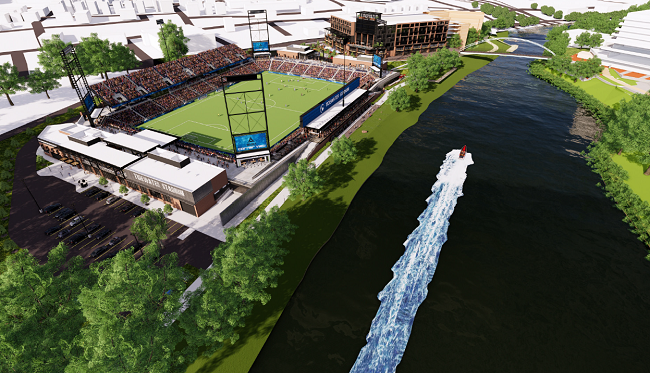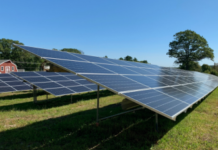
PAWTUCKET – A $60 million price hike in the expected cost of the Tidewater Landing project has the effort’s partners calling to double the public financing.
Not only is the flagship soccer stadium anchoring the project going to be more expensive, but the the housing, retail and public infrastructure improvements are also going to cost more because of “unprecedented inflationary impacts,” according to testimony by Dylan Zelazo, the city of Pawtucket’s director of administration, which was submitted to the R.I. Commerce Corp. Investment Committee and shared with PBN on Wednesday.
To close the funding gap in the now-$344 million project (originally pegged at $284 million), the city and developer, Fortuitous Partners, have proposed changes to the funding plan including more private investment and public financing.
The proposal to be discussed before R.I. Commerce Corp. Wednesday calls for the state to borrow $30 million more than has already been approved, doubling the amount of city and state bonds from $36.2 million to $66.2 million. Under the tax-increment financing plan, the revenue from the project will be used to pay back those bonds, which will only be used for public infrastructure.
Another $10 million in net state tax credits has also been approved by R.I. Commerce Corp.
The developer will foot the rest of the bill, agreeing to put in another $25 million in private equity and $31 million in private debt investment to cover the higher costs.
While the price hikes stem from inflation and supply chain woes that were unanticipated when the project was first laid out in 2019, project partners always anticipated that the public contributions would be about 20% of the cost – $70 to $90 million based on initial cost estimates, Zelazo said.
The proposed increase in tax-increment financing stays within those previous projections, and also preserves the same protections for taxpayers, Zelazo said in an interview on Wednesday.
“The guiding principle all along has been that the TIF tool passed by the General Assembly is based on the idea that the revenues generated are going to support that project,” Zelazo said. “These properties we’re developing are critical riverfront gateway properties that have long sat undeveloped.”
However, there’s no guarantee that costs won’t run up even further down the line. The $344 million price tag covers only the first phase of the project, which includes the 10,000-seat United Soccer League stadium, outdoor event plaza and a riverwalk on the 17-acre Tidewater site west of the Seekonk River. There would also be 435 housing units, plus a parking garage and retail and commercial space, according to prior plan documents.
A second phase including a hotel and indoor event center along Division Street east of the river may also cost more than expected if it comes to fruition – likely not until after 2025 and dependent upon market demand. Zelazo couldn’t say for sure whether the cost would increase or whether more public financing would be required.
“The future phase is still conceptual in nature,” Zelazo said. “The capital stack is hard to put your finger on.”
Whether the increased project costs will also push back the timeline is also unclear. Previously signed agreements between the city and the developer called for the stadium to be open for a spring 2023 season.
Zelazo said the city needed to “prepare to be flexible” on timelines, touting economic benefits of the project not just for the city but for the entire state of Rhode Island.
The project is expected to create more than 2,500 direct and indirect construction jobs and 1,200 permanent jobs, while adding $130 million annually to the state GDP, according to data shared by the city in 2019.
Any changes in public financing will require approval from RI Commerce. The board of directors is slated to discuss the proposal in executive session at a meeting Wednesday. No votes have been scheduled on the funding changes.
Nancy Lavin is a PBN staff writer. You may reach her at Lavin@PBN.com.













Fortuitous Partners? Seriously? They don’t sound very fortuitous to me, or intelligent, for that matter.
Fasten your seat belts, taxpayers. This is going to be Pawtucket’s 38Studios.
It’s a good thing this will not be another 38 Studios debacle. We are lucky that there aren’t a couple of conservative republicans with no business experience or political competence rolling around on the floor licking each other with excitement over stealing from taxpayers. Everyone knew 38 Studios would be a disaster with a republican governor and a conservative sports loser at the helm.